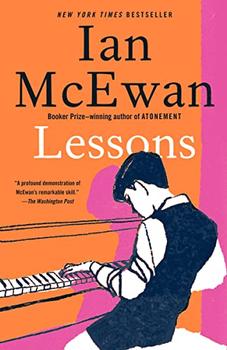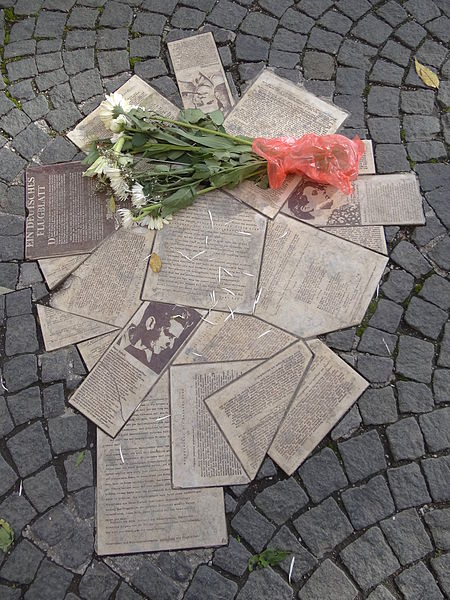Summary | Excerpt | Reading Guide | Reviews | Beyond the Book | Read-Alikes | Genres & Themes | Author Bio

A novel
by Ian McEwanThis article relates to Lessons
 In Ian McEwan's Lessons, Roland Baines, a member of the English baby boomer generation, who "as they turned adult" began "to wonder at the dangers they never had to face," contrasts his own achievements disparagingly with his German father-in-law's association with the White Rose anti-Nazi movement during World War II. This nonviolent resistance group was formed in Munich in 1942 and consisted mainly of students, including siblings Hans and Sophie Scholl, Willi Graf and Alexander Schmorell.
In Ian McEwan's Lessons, Roland Baines, a member of the English baby boomer generation, who "as they turned adult" began "to wonder at the dangers they never had to face," contrasts his own achievements disparagingly with his German father-in-law's association with the White Rose anti-Nazi movement during World War II. This nonviolent resistance group was formed in Munich in 1942 and consisted mainly of students, including siblings Hans and Sophie Scholl, Willi Graf and Alexander Schmorell.
As Heinrich, Roland's father-in-law, insists, not wanting to be misrepresented by those who prefer their heroic legends simple and clean, there were other scattered efforts to resist National Socialism. Yet those who refused to comply with the monstrous regime were but a tragically minuscule fraction of those who did. And the White Rose remains the post-war German government's favorite example of a minority of its citizenry clinging to the humane values the rest were dutifully destroying, to the point that their story, having become "the staple of the classroom, of bad poetry, of easy sentiment and sanctity," has acquired a stale air of "officialdom" to many modern Germans.
But to those of us who, like Roland Baines, weren't inundated with the White Rose growing up and haven't taken the critical next step of focusing on the group's failings (some of them were initially Hitler Youth, they addressed "the Jewish question" less unequivocally than it needed to be), the righteous self-sacrifice of these young dissidents may have an awesome power.
Their main endeavor consisted of writing and distributing leaflets (initially through the mail) that accused the Nazis and their followers of horrendous crimes, and calling for people to see the truth, rise up and resist in any way they could that was in line with passive resistance, like refusing to donate metal and textiles to government collections. The first transmission begins, "Nothing is more shameful to a civilized nation than to allow itself to be 'governed' by an irresponsible clique of sovereigns who have given themselves over to dark urges–and that without resisting."
In early 1943, emboldened by the German army's defeat at Stalingrad and their fellow students' increasing interest in resistance groups, and anticipating the Nazis' imminent downfall, the White Rose took a more direct strategy in distributing leaflets, personally handing out their literature to passersby and tagging walls in Munich with their cause's slogans. Thus came the arrest of Sophie and Hans Scholl.
On February 18, Sophie stood on an upper story above the central hall of her university and flew down a pile of leaflets. She was reported by a janitor, after which she and Hans were swiftly rounded up by the Gestapo. In Hans's bag was the draft of their next leaflet, which implicated fellow member Christoph Probst and resulted in his arrest later that day.
The three were put through a mock trial, harshly interrogated and given a death sentence for treason. Though they took full responsibility for all of the White Rose's activity, members Willi Graf, Alexander Schmorell and Kurt Huber were soon to be executed as well. Asked if she considered her actions a crime, Sophie calmly responded, "I am, now as before, of the opinion that I did the best that I could do for my nation. I therefore do not regret my conduct and will bear the consequences that result from my conduct." The trio were guillotined on the 22nd.
While their murders received scant notice in Germany at the time, the New York Times and BBC acknowledged the group's actions, and reprints of their sixth leaflet were dropped over Germany by the Allies in July of 1943. Today the White Rose are venerated in their country. Streets, schools and awards are named after the members. A memorial made up of the group's six leaflets can be found in front of Ludwig Maximilian University. In an article for the National WWII Museum in New Orleans, German contributor Tanja B. Spitzer writes, "Sophie's story looms especially large in the history of Ulm, my hometown. She personifies the importance of acting according to one's beliefs and of following your conscience, even in the face of great sacrifice. In our collective memory, her story reminds us to not be silent, and fight for what Sophie wrote on the back of her indictment a day before she was killed: Freiheit—Freedom."
White Rose Movement Public Memorial at Ludwig Maximilian University in Munich, Germany.
Photo by Adam Jones, Ph.D. (CC BY-SA 3.0)
Filed under People, Eras & Events
![]() This "beyond the book article" relates to Lessons. It originally ran in November 2022 and has been updated for the
August 2023 paperback edition.
Go to magazine.
This "beyond the book article" relates to Lessons. It originally ran in November 2022 and has been updated for the
August 2023 paperback edition.
Go to magazine.
Your guide toexceptional books
BookBrowse seeks out and recommends the best in contemporary fiction and nonfiction—books that not only engage and entertain but also deepen our understanding of ourselves and the world around us.